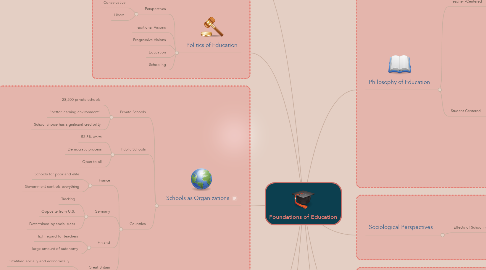
1. Politics of Education
1.1. Perspectives
1.1.1. Conservative
1.1.2. Liberal
1.2. Traditional Visions
1.3. Progressive Visions
1.4. Education
1.5. Schooling
2. Schools as Organizations
2.1. Private Schools
2.1.1. 28,200 private schools
2.1.2. "better learning environment"
2.1.3. School choice has significant credibility
2.2. Public Schools
2.2.1. 53.5% white
2.2.2. Democratic process
2.2.3. Open to all
2.3. Countries
2.3.1. France
2.3.1.1. Schools for poor and elite
2.3.1.2. Government controls everything
2.3.2. Germany
2.3.2.1. Tracking
2.3.2.2. Opposite from U.S.
2.3.2.3. Determined by social class
2.3.3. Finland
2.3.3.1. High regard for teachers
2.3.3.2. large amount of autonomy
2.3.4. Great Britain
2.3.4.1. Stratified socially and economically
2.3.4.2. No comprehensive high schools
3. Philosophy of Education
3.1. Teacher -Centered
3.1.1. Essentialism
3.1.1.1. Emphasis on Academics
3.1.1.2. Curriculum determined by administrators and teacher
3.1.2. Perenialism
3.1.2.1. Focus on classic ideas
3.1.2.2. Little flexibility
3.1.2.3. Focus on concept rather than facts
3.1.2.4. Emphasis on humanities and great books
3.2. Student-Centered
3.2.1. Progressivism
3.2.1.1. Education based on needs and interest of students
3.2.1.2. Students learn by doing as well as from textbooks
3.2.1.3. experiential learning
3.2.1.4. Emphasis on natural and social sciences
3.2.1.5. Teaching through field trips and games
3.2.1.6. John Dewey
3.2.1.6.1. Father of modern education
3.2.1.6.2. Scientific inquiry
3.2.2. Constructivism
3.2.2.1. Learner centered
3.2.2.2. Constant need to make sense of new information
3.2.2.3. Scaffolding links new information
4. History of U.S. Education
4.1. Old Deluder Laws
4.1.1. Project specifications
4.1.2. End User requirements
4.1.3. Action points sign-off
4.2. Public Schools (boys only)
4.3. Meritocracy
4.4. Civic Motive
5. Equality of Opportunity
5.1. Gender
5.2. Race
5.3. ACT/ SAT
5.4. Class
6. Sociological Perspectives
6.1. Effects of Schooling on Individuals
6.1.1. Knowledge and Attitudes
6.1.2. Employment
6.1.3. Teacher behavior
6.1.4. Student peer groups and alienation
7. Educational Inequality
7.1. Functionalist Theorists
7.1.1. Students hard work
7.1.2. Desire to suceed
7.2. Conflict Theorists
7.2.1. Affected by enviroment
7.2.2. Families Class
7.3. Interactionists Theorists
7.3.1. Family
7.3.2. Social Class
7.3.3. Enviroment
8. Pedagogy
8.1. Political Influences
8.1.1. Government Officials/ Legislature
8.2. Societies Influences
8.2.1. money
8.3. Social Influences
8.3.1. Community
8.4. Cultural Influences
8.4.1. Where you come from
8.5. Special Interests
8.6. Cirriculum
8.6.1. Formal
8.6.1.1. what is cognitively taught (subjects)
8.6.2. Informal or Hidden
8.6.2.1. taught but not obvious to sight
8.6.3. Null
8.6.3.1. what is not taught but is learned (values of the community)
